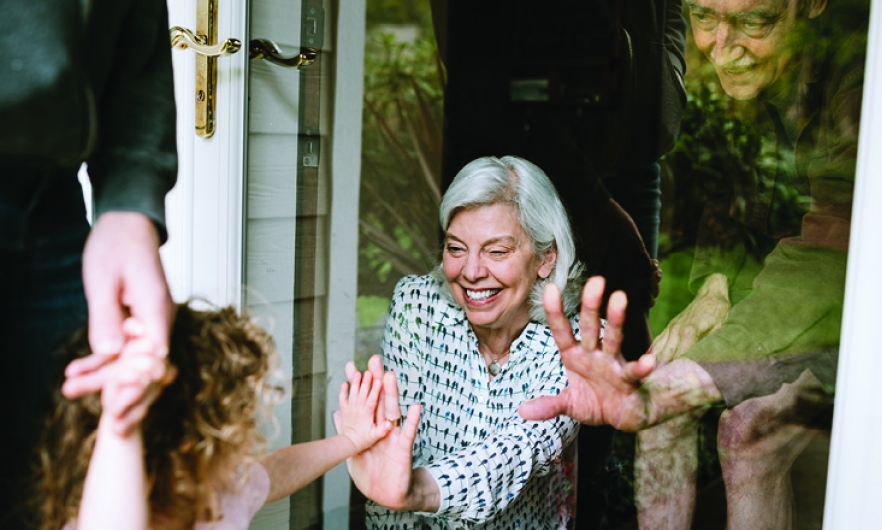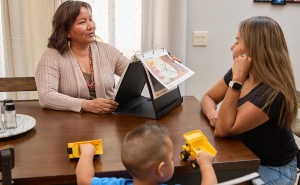How to “Reach In” to Meaningfully Connect with Loved Ones from Afar
Why and how to find ways to meaningfully connect when physically separated

Re-connecting face-to-face with vulnerable loved ones may be appealing at this point in the pandemic and around the holidays, but in many situations, it continues to be risky and unadvisable.
While there are many unknowns about COVID-19, protecting those you love this year could help ensure in-person gatherings for the future.
As an alternative, mental health researchers Laura Murray, PhD and Elizabeth Stuart, PhD, AM, and epidemiologist Keri Althoff, PhD discuss the concept of “reaching in” to loved ones from afar in order to support their mental, emotional, and physical health in creative—and safe—ways.
What is “reaching in”?
KA: “Reaching in” involves finding ways to connect with those who may not be able to be face-to-face with their loved ones. The goal is to create meaningful connections that help to maintain mental and emotional health while reducing the risk of COVID-19 transmission, which can make us feel better physically as well.
How has “reaching in” been used prior to COVID-19?
KA: Many people have been “reaching in” to connect with loved ones who live far away distances, in care facilities, or in other settings that have barriers prior to COVID. It has been found to be especially important for the significant proportion of older adults who experience social isolation due to being homebound or ill.
“We know that having strong social connections is associated with important positive health effects: increased longevity, better immune function, and improvement in cardiac health” adds Alicia Arbaje, an internist, geriatric medicine specialist and researcher at Johns Hopkins University School of Medicine.
How do I figure out what types of remote interactions will work for my loved ones?
LM: There really is no one-size-fits all for what people need or want during this time. Just like we all have different “love languages,” we encourage people to reach out to their loved ones to ask what would help them feel connected, or suggest ideas if they know the person well.
For example, setting up a pen pal or being a pen pal may work better for the elderly rather than using digital technology. There may be ways to connect with other people in the area if family cannot fly in. Some people like surprise gifts, others like talking, and would rather have help setting up safe house cleaning in order to “feel better”. It’s good to think out of the box, rather than defaulting to what works for a lot of people or what we normally do. Generating ideas in a free-flowing manner even if they seem crazy is a great exercise.
What are some other creative ideas and tips?
- Send photos or newspaper clips that made you think of the person
- Send a favorite recipe
- Bake a favorite treat and send it through the mail
- Send hand-written or decorated cards
- Read a book together, virtually
- Send a jigsaw puzzle or other gift they might enjoy that would help with brain health too
- Connect via teleconference for one-on-one or large group discussions, and ask them to tell stories of their memorable holiday celebrations
- Say grace with each other over the phone before a meal
- Drive by a loved one’s house to wave and chat with on the phone while physically able to see each other from the house to the car
- Create a recurring activity that you can put on the calendar, e.g., always call on Sunday at 5pm, so they know to look forward to it (and you remember to do it).
These types of activities can be very helpful in strengthening our connections.—ES
How can reaching in help now? Who is it a good solution for?
KA: Reaching in can be good for everyone right now. Right now, we are spending more time with our households and less time shuttling kids to activities or preparing for large gatherings. Taking advantage of the decrease in hustle and bustle to divert your energy into being present and celebrating each other, even from afar, may result in everyone feeling more connected and renewed.
What else should I keep in mind?
LM: Your mindset also has big implications for how you view things and how you feel. Practice gratitude and a positive mindset, rather than focusing on what we cannot have or do this year, and encourage others to do the same. Be thankful for the meaningful things you can still do together. This helps us begin to reinforce neural pathways, which then become our go-to thoughts.
Keri Althoff, PhD ’08, MPH ’05, is an associate professor in Epidemiology with a joint appointment at the School of Medicine. She is the Provost’s Fellow for Research Communication at Johns Hopkins.
Laura K. Murray, PhD, MA, is a clinical psychologist and a senior scientist in Mental Health at the Bloomberg School.
Elizabeth Stuart, PhD, AM, is the associate dean for Education at the Bloomberg School and a professor in Mental Health, Biostatistics, and Health Policy and Management. She was recently appointed as a Bloomberg Professor of American Health.
RELATED CONTENT
- Friday Mental Health Q&A: Dealing with Election Anxiety, Hard Decisions About Holiday Plans, and COVID Fatigue
- How Can I Ask My Friends to Wear Masks? Talking to Friends, Family, Kids, and Coworkers About COVID-19 Safety
- How to Make Decisions About Winter Holiday Gatherings Amid COVID-19
- Innovative Holiday and Winter Gatherings in the Time of COVID-19
- Home Visiting Programs Adapt to Connect with Vulnerable Families





